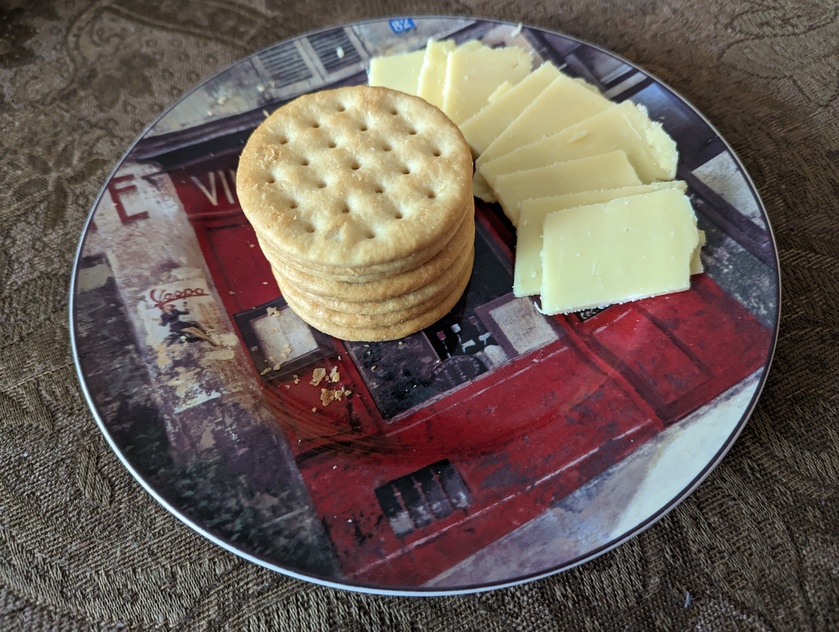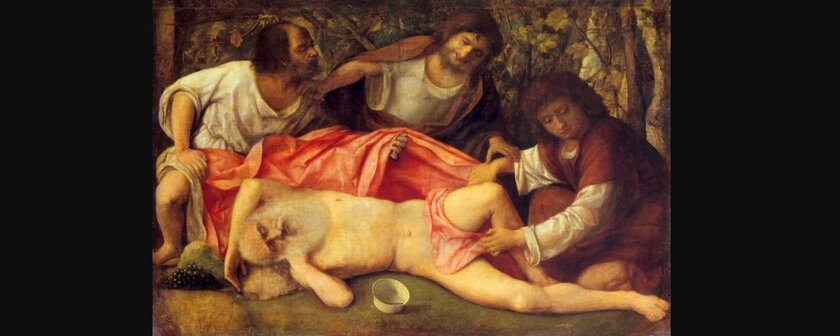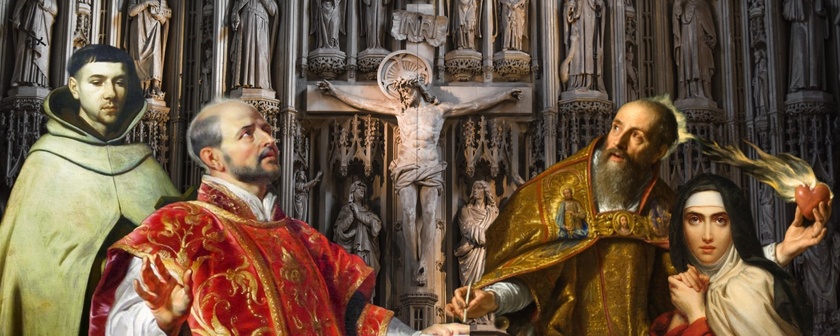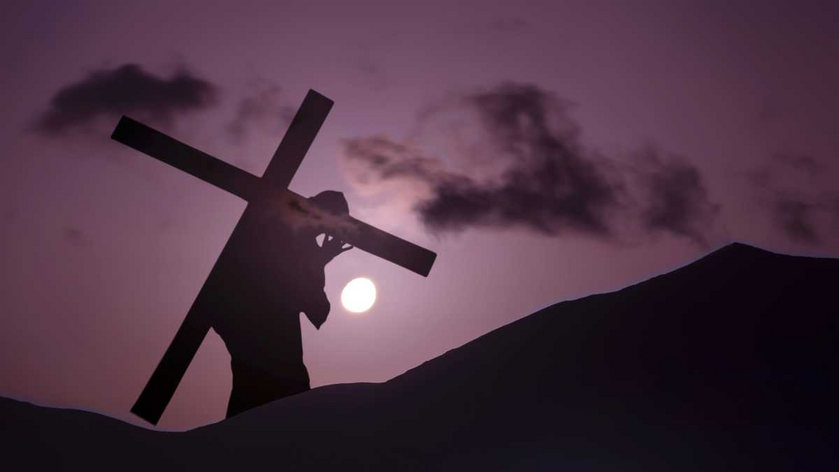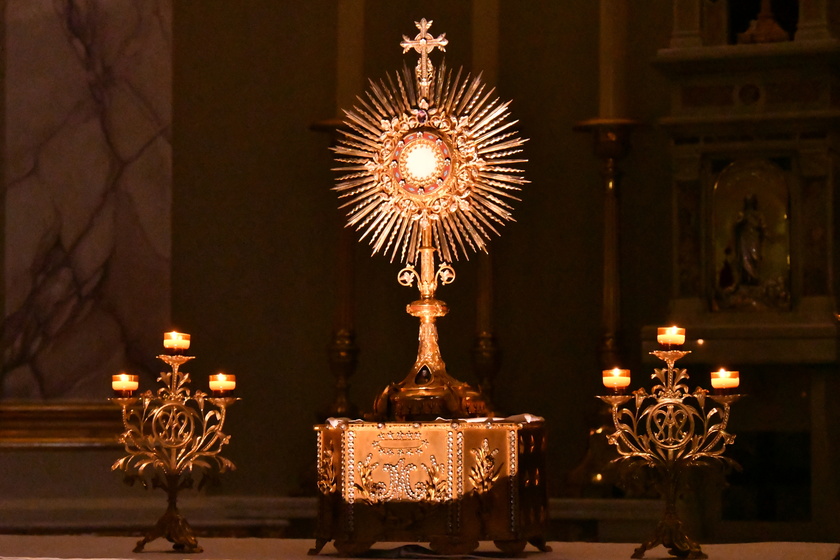
Fr. Donald Calloway who, as a teen, was a drug mule for the Yakuza “Japanese mafia,” explained his conversion experience to Matt Fradd on Pints with Aquinas when he encountered the Eucharist for the first time: “That dude went up to that table – the altar of course – bent over, [the Filipino women are] on their knees, he picks up the little white circle . . . and he said this, man, ‘Take this all of you and eat of it. This is my body.’ And he held it up like he was showcasing it. . . . Dude, I’m in the back and I’m thinking, ‘You’re a madman, bro!’ He just told us that that’s his body and we gotta eat it. . . . And it was like he stood there for a long time, as though somebody came in and pressed pause on the room, and then I heard a voice . . . and it wasn’t spoken to my ear. It was spoken to me,” he says as he points to his heart. “And that voice said to me: ‘Worship.’ I had what I could only call an infusion of knowledge. I knew what that man had in his hands was God. . . . I saw that man say to each one of those women, ‘The Body of Christ.’”
When I heard that story, I wanted what Fr. Calloway had. I wanted to be able to look at the Eucharist and know that that is God.
But that never happened.
I saw that interview before I came back to the Catholic Church after a 10-year hiatus. Since then, before every Mass, I tell God some version of the following: “When I look at the Eucharist, I want to believe with all my heart, with everything that I am, that that is you.” Sometimes, I request, “Jesus, I want to see you. I want to recognize you.” Sometimes, it’s a simple as, “Help me believe.”
But what does it mean to see? What is faith? If you don’t believe in the Real Presence of Jesus Christ, do you lack faith? Should you receive the Eucharist if you don’t believe? Do Mass-going Catholics really believe who the Eucharist is claimed to be? What does it mean to believe?
Joe Bukuras shared in The Catholic World Report in 2023 that, “The [Center for Applied Research in the Apostolate (CARA)] study said that 95% of weekly Mass attendees and 80% who attend at least once a month believe in the Real Presence.” This was in contrast to a 2019 Pew Research study that indicated that only one-third of US adult Catholics believed, but one has to ask whether all of these self-described Catholics were actually attending church. I even took a survey with my own parish to which I answered yes, I believe in the Real Presence, but what does that even mean? I could have answered no for an equal number of reasons.
The real question we need to ask is: Do you believe in the Real Presence of Jesus Christ in the Eucharist?
- Yes
- No
- It’s complicated.
I think if Mass-going Catholics were asked this question, there would be many more in the it’s complicated category with me.
When I ask God to help me to “believe with all my heart, with everything that I am,” do I really know what I’m asking for? Do I understand what that looks like, what it entails? I can tell you from experience that I am well aware that when I ask God for something, I have no idea what I’m really asking for and that He will do it His way and in His time.
To say that I lack faith would do a great disservice to the confusing and exciting experience I’ve been living these past two years. I think my faith is actually quite strong.
In 2021 as the COVID lockdowns and unemployment were coming to an end, I suddenly found myself fearful and losing hope with the direction this world was heading. It had finally sunk in that our global leaders managed to take the Eucharist away from Catholics worldwide. As a cradle Catholic who never really put much thought into the Eucharist, and hadn’t regularly attended church for 10 years, I suddenly felt a desperation for the freedom to choose to receive the Eucharist, and I pled, “God, I’m scared. I hate this world. Please save me.”
After eight months of praying, watching lots of YouTube videos, feeling a looming darkness, and hearing over and over again to go to Confession and come back to Mass (thank you, Fr. Mike Schmitz), I finally returned on Palm Sunday of 2022. I immediately fell in love with the Mass and Sunday became the high point of my week. I left every Sunday feeling completely calm and at peace with a cleared mind, which is not like me at all.
Something embarrassing also started happening. I began crying during Mass. I’m not much of a crier unless I’m enjoying wine and my friends make me laugh so hard it hurts. There is also the super rare betrayal or anger cry. Finally, The Wedding Singer cry is also a thing. But this cry doesn’t fall into any of those categories, so what was happening? I call it the Holy Spirit cry.
You cannot feel the love another person has for you, but only the love you have for them. But God can choose to allow you to feel His love, and I do believe that is what I experienced throughout 2022 and some of 2023, and recently it has returned at a new level that just wrecks me. For me, the Holy Spirit cry happens when I am suddenly overcome by a twinge to the heart that produces a rapid shock to the system to the point that I cannot contain it, and so I burst into tears. These are not tears of sadness, nor laughter, nor anything I had experienced in the first 44 years of my life. Rarely, tears of no known cause occur.
My parish holds a monthly Eucharistic event that I attend in addition to our Friday adoration. One day, I was kneeling at this event, eyes closed, just resting, and suddenly tears started streaming down my face. I wasn’t sad or upset. I didn’t have a thought that would trigger an emotional response. I was simply sitting in peace. At the onset of these tears, and in my confusion, I opened my eyes to see that the monstrance now contained the Eucharistic host that our priest had just placed there.
At a later time, I peacefully sat in adoration with a general feeling of contentment and suddenly realized that a stream of tears had taken over my right cheek. My immediate response in quiet prayer was, “Can we please not do this now? Please?” The tears immediately stopped. That’s the only time my tears have stopped on demand, and I stopped having those crying experiences for several months, which I thought was great, because I hate crying in front of people.
My parish recently gave out the book, Beautiful Eucharist, put out by Dynamic Catholic, which contains writings about conversion and the Eucharist by widely respected Catholic influencers like Fr. Mike Schmitz, Peter Kreeft, and Fulton Sheen. The chapters of this book are filled with wonderful and inspiring contributions, and I actually recommend reading it, but the author of the last chapter, Matt Warner, perfectly and unintentionally summed up the problem not only with the book, but with all of the Eucharistic inspirational events, podcasts, and books that I’ve seen thus far, including retreats, conferences, and articles intended to inspire belief in the real presence of Jesus Christ in the Eucharist. According to Warner:
...no matter the soundness of the apologetics or truth-bombs dropped, the effectiveness of any message is always limited by a person’s capacity to receive it. . . . That capacity for a person to receive a message is determined by many things, such as their relationship with the person speaking, their perception of (in this case) the Church, their own immediate needs, experiences of suffering, and many other factors that are independent of the words we say or the finely-reasoned arguments we share. More than all that still, and perhaps the biggest factor influencing one’s capacity to receive a given message, is their worldview.
Mr. Warner failed to understand that his own worldview was preventing him from seeing the real cause of the problem of people’s failure to recognize the Real Presence of Jesus Christ in the Eucharist: grace.
The Catechism of the Catholic Church (CCC 1996-1997) explains, “Grace is favor, the free and undeserved help that God gives us to respond to his call to become children of God, adoptive sons, partakers of the divine nature and eternal life. Grace is a participation in the life of God.” Anything gifted to us by God is grace, even faith (CCC 2003).
God gives out grace like Oprah gives out cars, but unless you are unwilling to unclench your fist and open your hand so He can drop the keys into your palm, you won’t be driving the gracemobile home. This is an important distinction. You are not in control. You cannot earn or take grace. You receive it, and this is observed in the posture one takes while receiving Holy Communion. One does not take the host or the wine; one receives. It is given to you.
Jesus tells us in Matthew 7:7-8, “Ask, and it will be given you; seek, and you will find; knock, and it will be opened to you. For every one who asks receives, and he who seeks finds, and to him who knocks it will be opened.”
Belief is given to us by the grace of God, and if you struggle with belief, you must ask for it.
A lot of us have expectations of what it looks like to believe, but this preconception stands in the way of knowing how much we actually do believe because we don’t see in ourselves what we would expect.
To me, belief in the Eucharist meant having that special experience of looking and knowing that it is Jesus, not just with my mind, but with everything that I am. It isn’t some superficial understanding of Catholic teaching that I seek, but to truly know Him.
It is as though my head and my heart are disconnected so that I cannot see Him. My heart sees something my eyes cannot, and it comprehends that which my mind cannot. While I continue to pray for the sight to see Him in the Eucharist, I’ve come to realize that while God may not give me that grace, He has been answering my prayer this whole time in a much deeper way.
Over the last few years, my prayer life has radically changed from one of a desire to know God to one of interacting with him daily, of being more sensitive to his call to conversation, of recognizing Him and receiving what He chooses to give me. While I hate saying this because it sounds so cliché, I think I finally know what it’s like to truly have a personal relationship with Jesus, and yet the present state of this relationship is only scratching the surface of what will be.
I debated sharing this next part because it is so deeply personal and feels so out of place in 21st Century America, but I think it is the answer to all of my questions concerning belief in the Real Presence of Jesus in the Eucharist. I feel like I’m falling in love, a feeling I’ve always hated because it has been plagued with constant distraction, uncertainty, and insecurity. But this time, there is no uncertainty and insecurity, but focus remains a challenge.
I’ve cleared my calendar for the next two months – only church and work remain – not because of burnout or some other need for rest, but because I have an incredible need to draw closer to God. I have no idea what these next two months will look like because I’m not in control. I am not making plans. I simply go to Mass every day and actively pray, which includes sitting in silence ready to receive.
And isn’t that the whole point of the Eucharist? It doesn’t matter that I don’t recognize Jesus when I look upon it. It doesn’t matter that I can’t see behind the veil. What does matter is that I am doing what Jesus commanded, as the Catholic Church provides, and as Christ has increasingly drawn me to so, that my life can be transformed into one of moving closer to Him.
You stir us so that praising you may bring us joy, because you have made us and have drawn us to yourself, and our heart is unquiet until it rests in you. . . . You are . . . intimately present. . . . Who will grant me to find peace in you? Who will grant me this grace, that you would come into my heart and inebriate it, enabling me to forget the evils that beset me and embrace you, my only good? What are you to me? Have mercy on me, so that I may tell. - St. Augustine, The Confessions, translated by Maria Boulding
***
Image: Adoration of the Blessed Sacraement of the Church of the Sacred Heart of Monaco by Willuconquer - https://commons.wikimedia.org/wiki/Category:Eucharist#/media/File:Adoration_du_Saint_Sacrement_%C3%A0_l'Eglise_du_Sacr%C3%A9-Coeur_de_Monaco.jpg
Joe Bukuras, “New study shows that now almost two-thirds of US Catholics believe in Real Presence.” The Catholic World Report. - https://www.catholicworldreport.com/2023/09/29/new-study-shows-that-now-almost-two-thirds-of-us-catholics-believe-in-real-presence/
“An Interview with Fr. Donald Calloway.” Pints with Aquinas - https://www.youtube.com/live/Pr44q3zw4j8?si=vBu_7PqyGfkSW_1O&t=2137
